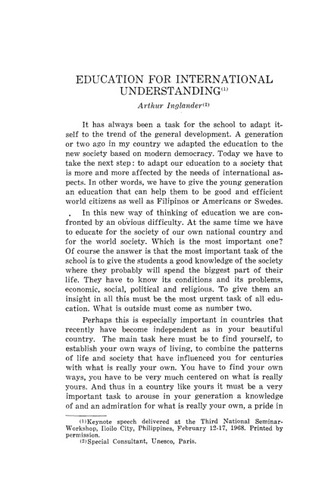Показать сокращенную информацию
Education for international understanding
| dc.contributor.author | Inglander, Arthur | |
| dc.date.accessioned | 2023-08-09T06:17:07Z | |
| dc.date.available | 2023-08-09T06:17:07Z | |
| dc.date.issued | 1968 | |
| dc.identifier.uri | https://hdl.handle.net/20.500.12852/2742 | |
| dc.description | Journal article | en_US |
| dc.description.abstract | Keynote speech delivered at the Third National Seminar-Workshop, Iloilo City, Philippines, February 12-17, 1968. The author is a special consultant to Unesco, Paris. It has always been a task for the school to adapt itself to the trend of the general development. A generation or two ago in my country we adapted the education to the new society based on modern democracy. Today we have to take the next step: to adapt our education to a society that is more and more affected by the needs of international aspects. In other words, we have to give the young generation an education that can help them to be good and efficient world citizens as well as Filipinos or Americans or Swedes. In this new way of thinking of education we are confronted by an obvious difficulty. At the same time we have to educate for the society of our own national country and for the world society. | en_US |
| dc.language.iso | en | en_US |
| dc.publisher | Central Philippine University | en_US |
| dc.subject.lcsh | Speeches | en_US |
| dc.subject.lcsh | Education | en_US |
| dc.subject.lcsh | International relations | en_US |
| dc.subject.lcsh | International education | en_US |
| dc.title | Education for international understanding | en_US |
| dc.type | Article | en_US |
| dcterms.accessRights | Publicly accessible | en_US |
| dc.citation.firstpage | 1 | en_US |
| dc.citation.lastpage | 7 | en_US |
| dc.citation.journaltitle | Southeast Asia Quarterly | en_US |
| dc.citation.volume | 3 | en_US |
| dc.citation.issue | 1 | en_US |


